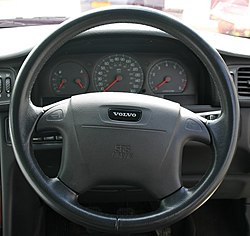Our website is made possible by displaying online advertisements to our visitors.
Please consider supporting us by disabling your ad blocker.
Steering wheel

A steering wheel is a circular object used by the driver of a car or boat to change the direction it is moving.[1]
The earliest known use of a steering wheel can be traced back to 1894 when Alfred Vacheron used one on his custom four-horsepower Panhard to participate in the Paris-Rouen race. That race in France in 1894 is one of the earliest known instances of a wheel-shaped device being used to steer a car.
In 1898 the French manufacturer introduced a steering wheel in all its models. Other manufacturers followed suit – and the steering wheel became a set part of automotive design. Early on, carmakers also began installing bulb horns on steering wheels, for as traffic increased, it became necessary to warn other drivers as well as pedestrians and cyclists.[2]
For about two decades thereafter, steering wheels were incredibly simple: wooden circles directly connected to the wheel axis. They served no other task and could be extremely hard to turn, especially at low speeds or when stationary. Though power steering patents were circulating as early as the steering wheel itself, it was quite a long time before these systems were used. In the 1920s, an engineer named Francis W. Davis wanted to make truck driving a little easier and invented the first power steering system to be fitted into a vehicle, which was inspired by earlier work on power steering systems used in ships.[3]
In the 1950s it became popular to line steering wheels with real or artificial leather, which gave drivers a better grip.
- ↑ Hyden, Stephen (2016-11-29). "Early History of the Steering Wheel". DriveTribe. Archived from the original on 2021-11-14. Retrieved 2021-11-14.
- ↑ Patrascu, Daniel (2010-05-05). "History of the Steering Wheel". autoevolution. Retrieved 2021-11-14.
- ↑ "Episode 2 - The evolution of the steering wheel through the advent of autonomous driving". www.mercedes-benz.com. Archived from the original on 2021-11-14. Retrieved 2021-11-14.
Previous Page Next Page


